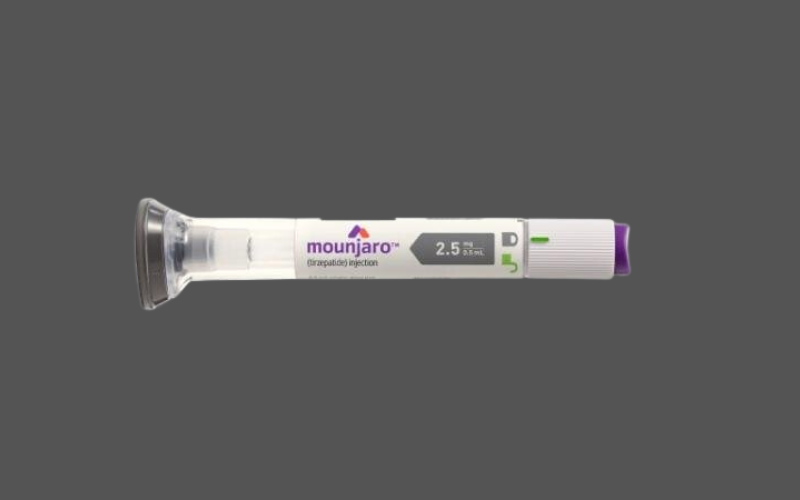What is Mounjaro? Does Mounjaro Work for weight loss? Is Mounjaro Approved for Weight Loss? How Does Mounjaro Work for Weight Loss? Is Mounjaro Safe for Weight Loss? Can I Take Mounjaro if I Don’t Have Diabetes? How Much Weight Can I Lose with Mounjaro? What Are the Side Effects of Mounjaro?
If you are searching for answers to these questions, you are in the right place! In this article, I will explain everything in simple terms so you can understand how does Mounjaro work for weight loss and whether it is the right choice for you.
Mounjaro is an FDA-approved drug originally developed for type 2 diabetes, but it is now being prescribed off-label for weight loss by many doctors. But is it really safe? Can you take it without diabetes? How does it compare to other weight loss drugs like Ozempic or Wegovy? Let’s break it all down and answer your most important questions.
Important: Mounjaro is not a cosmetic weight loss drug. It is a prescription-only medication, so you must consult a doctor before using it.
Table of Contents
What is Mounjaro?

Mounjaro (Tirzepatide) is an FDA-approved injectable medication primarily used to treat type 2 diabetes. It works by regulating blood sugar levels and controlling appetite. Recently, many doctors have started prescribing it off-label for weight loss because it helps people lose a significant amount of weight by reducing hunger and slowing digestion.
Does Mounjaro Work for Weight Loss?
Yes, Mounjaro works for weight loss, and the results are impressive! Many people who take Mounjaro lose 15-20% of their body weight over time. Some even lose 25-30 pounds in just a few months!
So, how does it work? Mounjaro helps control hunger, slows digestion, and makes you feel full for longer. This means you eat less without feeling like you’re starving. Plus, it helps your body burn fat more efficiently.
But remember, Mounjaro is not a magic pill. For the best results, you should also eat healthy and stay active. If you are struggling to lose weight, Mounjaro could be the boost you need! Always talk to your doctor before starting because this is not a cosmetic weight loss drug. It is a prescription-only medication, so you must consult a doctor before using it .
Is Mounjaro Approved for Weight Loss?
No, Mounjaro (Tirzepatide) is not officially approved for weight loss—yet! It is FDA-approved for type 2 diabetes, but many doctors prescribe it off-label for weight loss because it helps people lose a lot of weight.
Studies show that Mounjaro can help people lose 15-20% of their body weight, which is why it’s becoming so popular for weight loss. The good news? The FDA is reviewing it for official weight loss approval, so it may soon become an approved weight loss drug!
Until then, if you want to use Mounjaro for weight loss, you’ll need a doctor’s prescription.
How Does Mounjaro Work for Weight Loss?
Ever wish you could feel full longer, eat less without trying, and lose weight without crazy diets? That’s exactly how Mounjaro helps!
Mounjaro works by mimicking natural hormones in your body that control hunger, digestion, and blood sugar levels. Its main ingredient, Tirzepatide, activates two key hormones—GLP-1 and GIP—which work together to make weight loss easier and more effective.
- GLP-1 (Glucagon-Like Peptide-1): Slows digestion, helps you feel full longer, and reduces cravings. It also stabilizes blood sugar levels, preventing sudden hunger spikes.
- GIP (Glucose-Dependent Insulinotropic Polypeptide): Enhances the body’s ability to burn fat and improves insulin sensitivity, making weight loss more efficient.
How This Helps You Lose Weight:
- Less Hunger – You feel full faster and don’t crave food as often.
- Slower Digestion – Food stays in your stomach longer, reducing overeating.
- Better Blood Sugar Control – Prevents sugar crashes that make you feel hungry.
- More Fat Burning – Encourages the body to use stored fat as energy.
Because Mounjaro works on two weight loss pathways instead of one, it has been shown to help people lose 15-20% of their body weight—more than many other weight loss drugs!
Thinking about trying Mounjaro? Always talk to your doctor first to see if it’s right for you!
Is Mounjaro Safe for Weight Loss?
Yes, Mounjaro is generally safe for weight loss when used under a doctor’s supervision. It is FDA-approved for type 2 diabetes, but many doctors also prescribe it off-label for weight loss because of its proven results.
However, like any medication, Mounjaro has some side effects, including nausea, diarrhea, constipation, and mild stomach discomfort, especially when first starting. Most of these side effects improve over time.
Who Should Avoid Mounjaro?
- Pregnant or breastfeeding women
- People with a history of thyroid cancer or pancreatitis
- Anyone with severe digestive disorders
Studies show that Mounjaro helps people lose 15-20% of their body weight while also improving blood sugar control. However, it is not a cosmetic weight loss drug—you must get a doctor’s prescription before using it.
References:
🔹 FDA Information on Mounjaro
🔹 American Diabetes Association on GLP-1 Medications
Thinking about trying Mounjaro? Talk to your doctor first to see if it’s right for you!
Can I Take Mounjaro if I Don’t Have Diabetes?
Yes, but only with a doctor’s prescription. Mounjaro is FDA-approved for type 2 diabetes, but many doctors prescribe it off-label for weight loss because it helps people lose 15-20% of their body weight.
Even if you don’t have diabetes, Mounjaro can still work by reducing hunger, slowing digestion, and helping your body burn fat more effectively. However, it’s not for everyone, and you should always consult a doctor before using it.
Who Can Take Mounjaro for Weight Loss?
Mounjaro is FDA-approved for type 2 diabetes, but doctors may prescribe it off-label for people who have:
- People with obesity (BMI 30 or higher)
- People who are overweight (BMI 27 or higher) with weight-related conditions like PCOS or high blood pressure
- Those who have struggled with weight loss through diet and exercise
Who Should NOT Take Mounjaro?
- Pregnant or breastfeeding women
- People with a history of thyroid cancer or pancreatitis
- Anyone with severe digestive disorders
Since Mounjaro is not officially approved for weight loss yet, insurance may not cover it unless you have diabetes. Talk to your doctor first to see if it’s right for you!
How Much Weight Can You Lose with Mounjaro?
Clinical trials have shown that Mounjaro (tirzepatide) can lead to significant weight loss in individuals with obesity or overweight. In a 72-week study, participants lost an average of 15% to 20% of their body weight. For example, someone weighing 200 pounds (90 kg) could potentially lose 30 to 40 pounds (13.6 to 18.1 kg) over this period [Source].
Many users report noticeable weight loss within the first few months of treatment. However, results can vary based on factors such as diet, exercise, and dosage. It’s important to note that while Mounjaro can aid in weight loss, incorporating healthy eating habits and regular physical activity enhances its effectiveness.
Considering Mounjaro for weight loss? Consult with your healthcare provider to determine if it’s the right option for you and to discuss potential benefits and risks.
What Are the Side Effects of Mounjaro?
Like any medication, Mounjaro has some side effects, but most are mild and improve over time. Here’s what you need to know:
Common Side Effects (Usually go away as your body adjusts)
- Nausea – Feeling sick to your stomach, especially at the start
- Diarrhea – Loose stools or frequent bathroom trips
- Constipation – Some people experience slower digestion
- Stomach pain or bloating – Mild discomfort in the belly
- Reduced appetite – You may feel full faster and eat less
Less Common but Serious Side Effects (Rare, but important to know)
- Severe stomach pain or vomiting – Could be a sign of pancreatitis
- Gallbladder issues – Some people develop gallstones
- Thyroid concerns – There is a small risk of thyroid tumors (talk to your doctor if you have a family history)
- Allergic reactions – Swelling, rash, or difficulty breathing (seek help immediately)
How to Reduce Side Effects
- Start with a low dose and increase gradually
- Eat smaller, balanced meals to avoid nausea
- Drink plenty of water to help with digestion
- Avoid greasy or heavy foods to prevent stomach discomfort
Most people tolerate Mounjaro well, and side effects usually improve within a few weeks. But if you have severe or persistent side effects, talk to your doctor immediately.
Source: FDA Drug Trials Snapshots – Mounjaro
Thinking about trying Mounjaro? Always consult your doctor before starting!
How Does Mounjaro Compare to Other Weight Loss Drugs?
| Feature | Mounjaro (Tirzepatide) | Ozempic (Semaglutide) | Wegovy (Semaglutide) |
|---|---|---|---|
| FDA Approval | Diabetes (Off-label for weight loss) | Diabetes & Weight Loss | Weight Loss |
| Weight Loss (%) | 15-20% | 10-15% | 15% |
| Appetite Suppression | Strong | Moderate | Strong |
| Dosage | Weekly injection | Weekly injection | Weekly injection |
| Side Effects | Nausea, vomiting, diarrhea | Nausea, diarrhea, fatigue | Nausea, diarrhea, constipation |
How Does Mounjaro Help People with Diabetes Lose Weight So Effectively?
Understanding the science behind Mounjaro Weight Loss drugs
If you have diabetes and struggle with weight loss, you might be wondering—how does Mounjaro help with both? The secret lies in how it works in your body.
Mounjaro’s main ingredient, Tirzepatide, mimics two powerful hormones:
- GLP-1 (Glucagon-Like Peptide-1): Slows digestion, controls blood sugar, and reduces hunger.
- GIP (Glucose-Dependent Insulinotropic Polypeptide): Helps the body burn fat more efficiently and improves how insulin works.
Why This Leads to Weight Loss:
- You feel full faster – So you naturally eat less.
- Fewer cravings – No more sugar crashes that make you hungry.
- Slower digestion – Keeps food in your stomach longer, reducing overeating.
- More fat burning – Your body uses stored fat for energy instead of storing extra calories.
Why Is Mounjaro a Game-Changer for Diabetes?
Many people with type 2 diabetes struggle with weight gain, which makes blood sugar control harder. Mounjaro breaks this cycle by stabilizing glucose levels and reducing excess body fat at the same time.
This is why Mounjaro is considered a breakthrough in diabetes treatment—it manages diabetes and promotes weight loss together, improving overall health and making it easier to maintain long-term blood sugar control.
How to Incorporate Mounjaro Drug into Your Weight Loss Plan
Incorporating Mounjaro weight loss drugs into your weight loss plan can be a beneficial strategy to achieve your goals, especially if you have diabetes. Here are some guidelines on how to effectively include Mounjaro in your weight loss journey:
Consult your healthcare provider: Before starting any new medication or weight loss plan, it is essential to consult your healthcare provider. They can assess your specific health needs, evaluate the compatibility of Mounjaro with your existing medications, and provide personalized guidance.
Follow the prescribed dosage: Mounjaro weight loss drug should be taken as prescribed by your healthcare provider. The dosage and frequency will depend on your individual condition and treatment goals. It is crucial to adhere to the recommended dosage to ensure the drug’s effectiveness and safety.
Combine with a healthy diet: Mounjaro is most effective when combined with a balanced and nutritious diet. Try to eat vigorous diets like fruits and vegetables. Limit your intake of processed foods, sugary beverages, and high-fat items. A dietitian can assist you in creating a customized meal plan that aligns with your weight loss goals and diabetes management.
Engage in regular physical activity: Regular exercise plays a vital role in weight loss and overall well-being. Incorporate a mix of aerobic exercises, such as brisk walking, jogging, or cycling, along with strength training exercises to build lean muscle mass. Consult with your healthcare provider or a fitness professional to design an exercise routine suitable for your fitness level and health condition.
Monitor blood sugar levels: While taking Mounjaro weight loss drug, it is crucial to monitor your blood sugar levels regularly. This will help you understand the impact of the medication on your glucose control and enable adjustments if needed. Keep a log of your readings and share them with your healthcare provider during follow-up appointments.
Mounjaro for Weight Loss: Enhance Your Fitness Journey
Incorporating Mounjaro into your weight loss journey can significantly enhance your overall fitness efforts. Here are some techniques to combine with Mounjaro to optimize your results:
Set realistic goals: Establish realistic and achievable weight loss goals in consultation with your healthcare provider. This will help you stay motivated and focused throughout your fitness journey. Remember that sustainable weight loss is gradual and requires patience and consistency.
Create a balanced exercise routine: Combine Mounjaro with a well-rounded exercise routine that includes cardiovascular exercises, strength training, and flexibility exercises. Cardiovascular activities like running, swimming, or cycling help burn calories and improve cardiovascular health. Strength training exercises, such as weightlifting or bodyweight exercises, build muscle mass and boost metabolism. Flexibility exercises like yoga or stretching improve mobility and reduce the risk of injuries. Consult with a fitness professional to design a personalized exercise plan that suits your fitness level and goals.
Practice portion control: Alongside Mounjaro, practice portion control to manage your calorie intake effectively. Use smaller plates and bowls to control portion sizes, and pay attention to hunger and satiety cues. Eat mindfully, savoring each bite, and avoid distractions while eating. This mindful approach can help prevent overeating and promote healthier eating habits.
Keep a food diary: Maintain a food diary to track your daily food intake. This can help you become more aware of your eating patterns, identify potential triggers for overeating, and make healthier choices. Include details such as portion sizes, types of food, and any emotional or environmental factors that influence your eating habits. Reviewing your food diary regularly can provide insights and support better decision-making regarding your nutrition.
Seek support: Engage in a support system to stay motivated and accountable. Join weight loss support groups, seek guidance from a registered dietitian, or consider partnering with a workout buddy. Sharing your challenges, successes, and progress with others can provide encouragement and help you stay on track.
Prioritize self-care: Weight loss journeys can be physically and emotionally demanding. Incorporate self-care practices into your routine to manage stress, improve sleep quality, and enhance overall well-being. Engage in activities you enjoy, such as meditation, journaling, or spending time in nature. Taking care of your mental and emotional health is vital for long-term success.
How do Patients Take Mounjaro?
The administration of Mounjaro weight loss drug follows a specific protocol that should be carefully followed. Here are the guidelines for taking Mounjaro:
Dosage: Mounjaro is available in various strengths, and the appropriate dosage will be determined by your healthcare provider based on your individual needs. The dosage may vary depending on factors such as your weight, medical history, and response to the medication. It is crucial to take Mounjaro exactly as prescribed by your healthcare provider.
Timing: Mounjaro is typically taken orally, with or without food. Your healthcare provider will provide specific instructions regarding the timing of your dosage. It is important to adhere to the recommended schedule to maintain consistent blood levels of the medication.
Swallowing: Swallow the Mounjaro tablet whole with a glass of water. Do not crush, break, or chew the tablet unless instructed otherwise by your healthcare provider. Breaking or chewing the tablet may alter its effectiveness or result in an unpleasant taste.
Where to buy Mounjaro weight loss drugs and pricing options
Mounjaro weight loss drugs can be purchased from reputable online pharmacies or through authorized healthcare providers. It is of utmost significance to verify that you acquire authentic products from reputable sources in order to ensure their safety and efficacy. Steer clear of unauthorized sellers or websites that propose remarkably low prices, as these may present counterfeit or inferior goods. Avoid unauthorized sellers or websites with unusually low prices, as they might sell counterfeit or substandard items.
The pricing of Mounjaro weight loss drugs may vary depending on the specific medication and dosage prescribed. For the most accurate information regarding cost and potential insurance coverage, it is advisable to consult with your healthcare provider or pharmacist.. Additionally, inquire about any available discounts or savings programs that may help make these medications more affordable.
Frequently asked questions about Mounjaro weight loss drugs (FAQs)
Q. Is Mounjaro suitable for individuals without diabetes who want to lose weight?
Answer: Yes, but only with a doctor’s prescription. Mounjaro is FDA-approved for type 2 diabetes, but many doctors prescribe it off-label for weight loss due to its effectiveness. Clinical trials show it can help people lose 15-20% of their body weight. However, it’s not suitable for everyone, so consult your doctor before using it.
Q. Can Mounjaro be used as a standalone weight loss solution?
Answer: Mounjaro is most effective when used as part of a comprehensive weight loss plan that includes a healthy diet and regular exercise. It is not a standalone solution but rather a medication that supports weight loss efforts in individuals with diabetes.
Q. What are the common side effects of Mounjaro? or Mounjaro side effects.
Answer: Common side effects of Mounjaro may include gastrointestinal issues such as nausea, diarrhea, or stomach discomfort. It is important to report any unusual or persistent side effects to your healthcare provider for further evaluation.
Q. Can Mounjaro be used by individuals taking other medications?
Answer: It is important to inform your healthcare provider about all medications, supplements, or herbal products you are currently taking before starting Mounjaro. Your healthcare provider can assess the compatibility of Mounjaro with your other medications and make any necessary adjustments to ensure your safety and efficacy.
Q. How long does it take to see results with Mounjaro?
Answer: Most individuals begin noticing weight loss effects within 4 to 12 weeks of using Mounjaro. However, significant results may take longer, as weight loss is gradual. Consistent use combined with a healthy diet and exercise will improve results.
Q. How should Mounjaro be taken for weight loss?
Answer: Mounjaro is typically administered via a weekly subcutaneous injection. Your healthcare provider will guide you on how to properly inject the medication. It is important to follow the prescribed dosage and schedule to achieve the best results.
Q. Is Mounjaro approved for weight loss?
Answer: No, Mounjaro is not officially approved for weight loss yet. It is FDA-approved for type 2 diabetes, but doctors prescribe it off-label for weight loss. Clinical trials show it helps with significant weight loss, and FDA approval for weight management may come in the future. Always consult your doctor before using it.
Q. How much weight can you lose in a month with Mounjaro?
Answer: A recent study who were overweight or had obesity and type 2 diabetes. The results showed that those who took 10 milligrams (mg) of Mounjaro had an average weight reduction of 12%, while those on 15 mg lost up to 15% of their weight according to Reuters.
Q. is Mounjaro weight loss safe?
Answer: Mounjaro is generally safe for weight loss when prescribed by a healthcare provider, especially for those with type 2 diabetes. Common side effects include nausea and diarrhea, which often subside over time. Long-term safety is still under study, and it’s important to consult a healthcare provider before starting Mounjaro, particularly if you have underlying health conditions. Regular monitoring is recommended.
Q. How much weight can I expect to lose with Mounjaro?
Answer: Clinical studies show that patients using Mounjaro for weight loss may lose an average of 10-20% of their body weight, depending on factors such as diet, exercise, and overall health. Results can vary, and it’s important to follow your healthcare provider’s guidance for optimal results.
Q. How does Mounjaro work for weight loss?
Answer: Mounjaro works by enhancing insulin sensitivity, helping the body utilize glucose more effectively. It also acts on the brain’s satiety centers, promoting feelings of fullness and reducing cravings. Additionally, Mounjaro influences fat metabolism by increasing fat breakdown and inhibiting new fat cell formation, making it effective for weight loss.
Q. What are the side effects of Mounjaro?
Answer: The common side effects of Mounjaro include nausea, vomiting, diarrhea, and decreased appetite. These side effects are typically mild and subside after the body adjusts. Rare but serious side effects may include pancreatitis and kidney problems, so it’s important to consult a healthcare provider before starting the medication.
Q. Can Mounjaro be used for weight loss in people without diabetes?
Answer: Mounjaro has been approved for weight loss in individuals with type 2 diabetes, but its use in non-diabetic individuals for weight loss is not yet FDA-approved. Research is ongoing to explore its effectiveness and safety for people without diabetes. Always consult a healthcare provider before using Mounjaro for weight loss.
Q. Can I take Mounjaro if I am pregnant or breastfeeding?
Answer: Mounjaro is not recommended during pregnancy or breastfeeding, as its safety in these situations has not been established. It’s essential to discuss with a healthcare provider if you are pregnant, planning to become pregnant, or breastfeeding before starting Mounjaro.
Q. Is Mounjaro covered by insurance?
Answer: Mounjaro may be covered by insurance, especially for individuals with type 2 diabetes. However, coverage can vary depending on the insurance provider and plan. It’s recommended to check with your insurance company to confirm coverage and any potential out-of-pocket costs.
Q. Can Mounjaro be used with other weight loss medications?
Answer: Mounjaro can be used alongside other weight loss medications, but it’s crucial to do so under the supervision of a healthcare provider. Combining multiple medications may increase the risk of side effects, so a healthcare provider will determine the best course of action.
Q. Can Mounjaro be used with a low-carb diet?
Answer: Yes, Mounjaro can complement a low-carb diet. The drug helps regulate blood sugar and suppress appetite, making it easier to follow a low-carb diet. However, it’s important to discuss any dietary changes with a healthcare provider to ensure it aligns with your treatment plan.
Conclusion
In conclusion, Mounjaro is a revolutionary drug that offers promising benefits for individuals with diabetes who are embarking on a weight loss journey. By improving insulin sensitivity, suppressing appetite, and promoting fat metabolism, Mounjaro contributes to both blood sugar control and weight management. When incorporated into a comprehensive weight loss plan that includes a healthy diet and regular exercise, Mounjaro can enhance overall fitness efforts and lead to significant weight loss. However, it is essential to consult a healthcare provider, follow the prescribed dosage, and monitor blood sugar levels while taking Mounjaro to ensure its effectiveness and safety
Disclaimer:
The knowledge imparted within this manuscript serves a didactic and illuminating purpose exclusively. It must not be perceived as a surrogate for proficient medical counsel, diagnosis, or remedial interventions. It is highly recommended to solicit guidance from a proficient physician or other qualified healthcare provider for any health-related concerns or inquiries. Reliance on the information furnished in this manuscript is solely at one’s own risk.
For more information regarding Health topics click here




